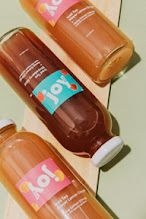The Board upheld the USPTO's refusal to register the proposed mark FOR JOY for, inter alia, tea-based beverages containing CBD, on the ground that the goods are per se violations of the Food, Drug, and Cosmetic Act (DCA), and therefore applicant lacks the required bona fide intent to lawfully use the mark in commerce under Sections 1 and 45. Applicant argued that its has "a bona fide intent to show legal use . . . in commerce in the future because it reasonably anticipates that the legal framework will change within a reasonable amount of time." Not good enough, said the Board. In re Joy Tea Inc., Serial No. 88640009 (September 1, 2021) [not precedential] (Opinion by Judge Robert H. Coggins ).

As Examining Attorney Tasneem Hussain pointed out, the FDCA prohibits "any food to which has been added . . . a drug or biological product for which substantial clinical investigations have been instituted and for which the existence of such investigations has been made public . . . ." 21 U.S.C. § 331(ll). There was no question that applicant's goods include food to which CBD has been added, that CBD was the subject of substantial clinical investigations during prosecution of the involved application, and that some of applicant's goods are therefore currently illegal under the FDCA.
The Board saw the issue at hand as "narrow and simple: whether an applicant for a federal trademark registration can have a bona fide intent to use its mark in commerce on goods that are currently prohibited under federal law but that may, perhaps, become lawful in the future."
Applicant sought to overturn, or at least narrow, the Board's holding in JJ206 that there can be no bona fide intent to use the mark in lawful commerce if the goods are unlawful. [TTABlogged here]." It argued that it has a "subjective intent to use its mark in future legal commerce" because it "anticipat[es] a beneficial change in the law within a reasonable amount of time."
The Board, however, ruled that it is "not possible to have a bona fide intent to use a mark on goods which are unlawful at the time of the application." Otherwise, the result would be "a mere reservation of a right in a mark until such time, if ever, at which the currently unlawful goods become lawful."
And so, the Board affirmed the refusal to register.
Read comments and post your comment here.
TTABlogger comment:
What if applicant applied to register the mark just for tea, with no mention of CBD? It could keep the application alive for three years after the notice of allowance, and maybe its CBD-infused tea would be legal by then.
The content of this article is intended to provide a general guide to the subject matter. Specialist advice should be sought about your specific circumstances.
